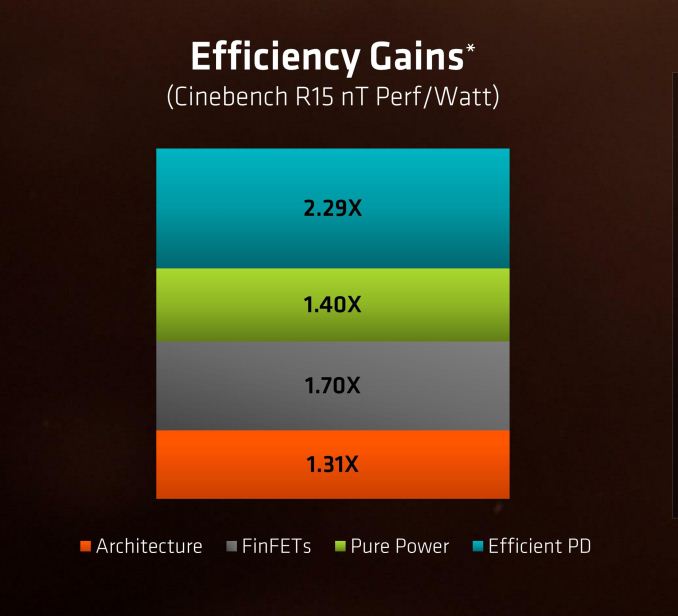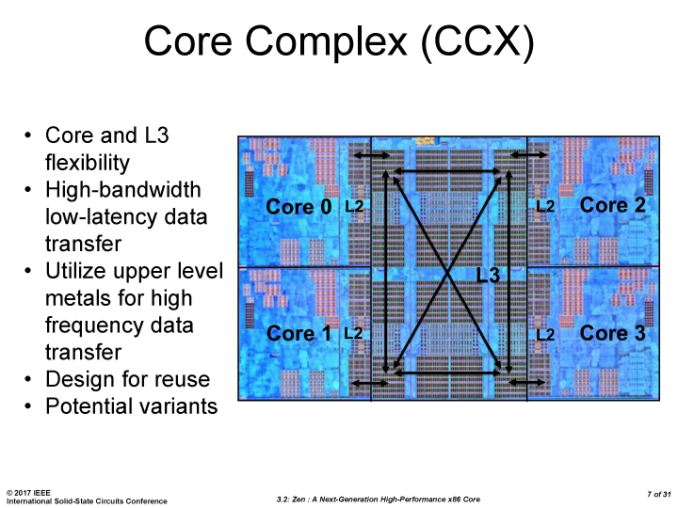The AMD Zen and Ryzen 7 Review: A Deep Dive on 1800X, 1700X and 1700
by Ian Cutress on March 2, 2017 9:00 AM ESTThe Ryzen Die
Throughout the time leading up to the launch of Ryzen, AMD reaffirmed its commitment to at least +40% IPC improvement over Excavator. This was specifically listed as a goal relating to performance, at an equivalent energy per cycle, resulting in a 40% increase in efficiency. At the Tech Day, AMD listed an overall 2.7x (or 270%) performance per watt improvement, split into the following:
Obviously a number of benefits come from moving the 28nm TSMC process to GloFo’s 14nm FinFET process which is used via a Samsung license. Both the smaller node and FinFET improvements have been well documented so we won’t go over them here, but AMD is stating that Zen is much more than this as a direct improvement to immediate performance, not just efficiency. While Zen is initially a high-performance x86 core at heart, it is designed to scale all the way from notebooks to supercomputers, or from where the Cat cores (such as Jaguar and Puma) were all the way up to the old Opterons and beyond, all with at least +40% IPC.
The first immediate image out of the presentation is the CPU Complex (a CCX), which shows the Zen core design as a four-CPU cluster with caches. This shows the L2/L3 cache breakdown, and also confirms 2MB of L3 per core with 8 MB of L3 per CCX. It also states that the L3 is mostly inclusive of the L2 cache, which stems from the L3 cache as a victim cache for L2 data. AMD is stating that the protocols involved in the L3 cache design allow each core to access the L3 of each other core with an average (but range) of latencies.
Over the next few pages, we’ll go through the slides. They detail more information about the application of Simultaneous Multithreading (SMT), New Instructions, the size of various queues and buffers, the back-end of the design, the front-end of the design, fetch, decode, execute, load/store and retire segments.














574 Comments
View All Comments
BurntMyBacon - Friday, March 3, 2017 - link
@ShieTar: "Well, the point of low-resolution testing is, that at normal resolutions you will always be GPU-restricted."If this statement is accepted as true, then by deduction, for people playing at normal (or high) resolutions, gaming is not a differentiator and therefore unimportant to the CPU selection process. If gaming is your only criteria for CPU selection, then that means you can get the cheapest CPU possible until you are not GPU restricted.
@ShieTar: "The most interesting question will be how Ryzen performs on those few modern games which manage to be CPU-restricted even in relevant resolutions, e.g. Battlefield 1 Multiplayer."
I agree here fully. Show CPU heavy titles to tease out the difference between CPUs. Artificially low resolutions are academic at best. That said, according to Steam Surveys, just over half of their respondents are playing at resolutions less than 1080P. Over a third are playing at 1366x768 or less. Though, I suspect the overlap between people playing at these resolutions and people using high end processors is pretty small.
Average frame rate is fairly uninteresting in most games for high end CPUs, due to being GPU bound or using unrealistic settings. Some, more interesting, metrics are min frame rate, frame time distribution (or simply graph it), frame time consistency, and similar. These metrics do more to show how different CPUs will change the experience for the player in a configuration the player is more likely to use.
Lord-Bryan - Thursday, March 2, 2017 - link
Who buys a 500 dollar cpu to play games at 720p res. All that talk is just BS.JMB1897 - Friday, March 3, 2017 - link
That test is not done for real world testing reasons. At that low resolution, you're not GPU bound, you're CPU bound. That's why the test exists.Now advance a few years into the future when you still have your $500 Ryzen 7 CPU and a brand new GPU - you may suddenly become CPU bound even at QHD or 4k, whereas a 7700k might not quite be CPU bound just yet.
MAC001010 - Saturday, March 4, 2017 - link
Or a few years in the future (when you get your new GPU) you find that games have become more demanding but better multi-threaded, in which case your Ryzen 7 CPU works fine and the 7700k has become a bottleneck despite its high single-threaded performance.This illustrates the inherent difficulty of comparing high freq. CPUs to high core count CPUs in regards to future potential performance.
cmdrdredd - Saturday, March 4, 2017 - link
"Or a few years in the future (when you get your new GPU) you find that games have become more demanding but better multi-threaded, in which case your Ryzen 7 CPU works fine and the 7700k has become a bottleneck despite its high single-threaded performance."Maybe, the overclocking scenario is also important. Most gamers will overclock to get a bit of a boost. I have yet to replace my 4.5Ghz 3570k even though new CPUs offer more raw performance, the need hasn't been there yet.
One other interesting thing is how Microsoft's PlayReady 3.0 will be supported for 4k HDR video content protection. So far I know Kaby Lake supports it, but haven't heard about any of AMD's offerings unless I missed it somewhere.
Cooe - Sunday, February 28, 2021 - link
Lol, except here in reality the EXACT OPPOSITE thing happened. A 6-core/12-thread Ryzen 5 1600 still holds up GREAT in modern titles/game engines thanks to the massive advantage in extra CPU threads. A 4c/4t i5-7600K otoh? Nowadays it performs absolutely freaking TERRIBLY!!!basha - Thursday, March 2, 2017 - link
all the reviews i read are using NVidia 1080 gfx card. my understanding is AMD graphics has better implementation of DX12 with ability to use multiple cores. I would like to see benchmarks with something like RX480 crosfire with 1700x. this would be in the similar budget as i7 7700 + GTX 1080.Notmyusualid - Friday, March 3, 2017 - link
http://www.gamersnexus.net/hwreviews/2822-amd-ryze...cmdrdredd - Saturday, March 4, 2017 - link
Overclocking will be interesting. I don't use my PC for much besides gaming and lately it hasn't been a lot of that either due to lack of compelling titles. However, I would still be interested in seeing what it can offer here too for whenever I finally break down and decide I need to replace my 3570k @ 4.5Ghz.Midwayman - Thursday, March 2, 2017 - link
Here's hoping the 1600x hits the same gaming benches as the 1800x when OC'd. $500 for the 1800x is fine, Its just not the best value for gaming. Just like the i5's having been better value gaming systems in the past.